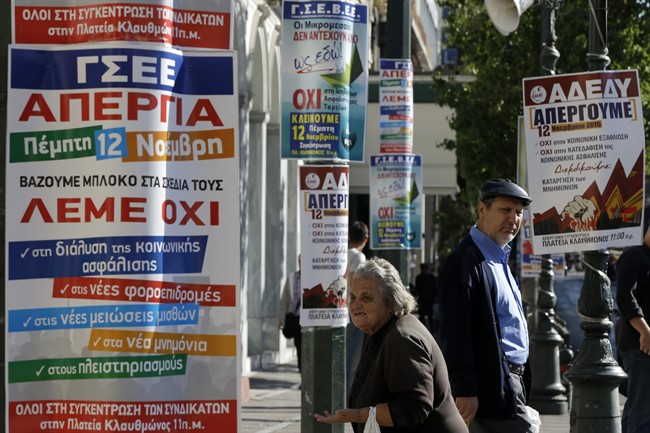ATHENS, Greece – Greece is bracing for the first general strike since the left-wing government first came to power in January, with workers across the country to walk off the job to protest against yet more spending cuts and tax hikes.

In a first, the governing Syriza party itself is backing the walkout against the measures, which leader Alexis Tsipras has said he had no choice but to implement as part of a bailout deal and avoid economic disaster.
READ MORE: European Central Bank review shows hole in Greek banks’ finances smaller than first feared
Thursday’s 24-hour strike is to shut down all public services, museums, schools and pharmacies, while public transport will be disrupted, ferries will remain tied up in port and hospitals will function with emergency staff.
More than a dozen domestic flights to small regional airports will be cancelled as civil aviation authority staff participate in the strike. Journalists will also walk off the job, cancelling all news broadcasts and online news updates.
Syriza’s Labor Policy division has called for mass participation from workers “against the neoliberal policies and the blackmail from financial and political centres within and outside Greece.”

Get weekly money news
READ MORE: Greece’s Tsipras faces first test since bailout rebellion
Prime Minister Alexis Tsipras won a second election in September after backing down from his previous anti-austerity positions and accepting a deal to impose further measures in return for a three-year, 86-billion euro bailout from other European countries.
The policy change was a dramatic shift from the platform on which he originally won elections in January, when he had vowed to rip up Greece’s bailout conditions and end austerity. But his brief first term proved tumultuous, with negotiations breaking down with the country’s European creditors and the government imposing restrictions on banking transactions and cash withdrawals to stem a bank run. Capital controls remain in place and it is unclear when they might be lifted.
The new government, a continuation of the coalition between Syriza and the small right-wing Independent Greeks, is now tasked with implementing the same policies Tsipras had initially vowed to abolish in return for the disbursement of bailout funds that will prevent the country from defaulting and potentially being kicked out of Europe’s joint currency.
On Monday, Greece failed to convince its European creditors it had done enough for them to release the next batch of funds from the bailout, with a meeting of eurozone finance ministers giving the country until the start of next week to reach a deal on outstanding issues.
The country is due a 2 billion euro installment ($2.2 billion), as well as 10 billion euros set aside for the recapitalization of its banks.
Although the government has met many of the conditions for the disbursement, dealing with non-performing loans and allowing the repossession of homes whose owners have fallen into mortgage arrears remain sticking points.







Comments